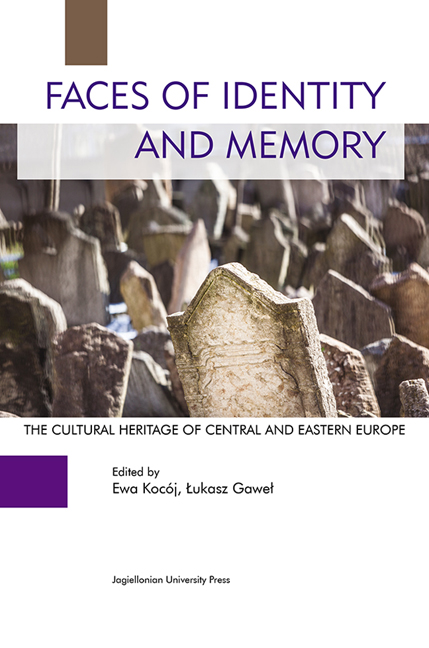 Faces of Identity and Memory
Faces of Identity and Memory Book contents
- Frontmatter
- Contents
- Introduction
- Memory and Identity. Monuments of Romanian Tangible Culture Inscribed on the UNESCO World Heritage List (a Short Presentation)
- Inventorisation and Recording of Sacral Art Objects in Lithuania in 1995–2005
- National lieux de mémoire and the European Heritage Label. Some Reflections on the Case of the Gdańsk Shipyard
- Porrajmos. Constructing Gypsy Holocaust Memory in the Recent Cinema
- The Vacuum and the Imagination of Space. The Cultural Role of the Żyznowski Publishing House
- Cultural Animation as the Art of Remembering. The Activities of the “Borderland of Arts, Cultures and Nations” Centre in Sejny
- ‘The Painted Village’ – Zalipie as an Expression of Ethnographic Tourism in the Powiśle Dąbrowskie Region of Poland
- 20th Century Theatrical Heritage: The Escape from Illusion
- Protection of Cultural Heritage. The Case of Krakow
- Managing an Artist's Legacy on the Example of Foundation for Support of Modjeska's Life and Art Research in Kraków
- Culinary Heritage as Used in the Present. Selected Elements of the Culinary Heritage Management in Contemporary Poland
Introduction
Published online by Cambridge University Press: 10 January 2018
- Frontmatter
- Contents
- Introduction
- Memory and Identity. Monuments of Romanian Tangible Culture Inscribed on the UNESCO World Heritage List (a Short Presentation)
- Inventorisation and Recording of Sacral Art Objects in Lithuania in 1995–2005
- National lieux de mémoire and the European Heritage Label. Some Reflections on the Case of the Gdańsk Shipyard
- Porrajmos. Constructing Gypsy Holocaust Memory in the Recent Cinema
- The Vacuum and the Imagination of Space. The Cultural Role of the Żyznowski Publishing House
- Cultural Animation as the Art of Remembering. The Activities of the “Borderland of Arts, Cultures and Nations” Centre in Sejny
- ‘The Painted Village’ – Zalipie as an Expression of Ethnographic Tourism in the Powiśle Dąbrowskie Region of Poland
- 20th Century Theatrical Heritage: The Escape from Illusion
- Protection of Cultural Heritage. The Case of Krakow
- Managing an Artist's Legacy on the Example of Foundation for Support of Modjeska's Life and Art Research in Kraków
- Culinary Heritage as Used in the Present. Selected Elements of the Culinary Heritage Management in Contemporary Poland
Summary
Cultural Heritage of Central and Eastern Europe is still little known, but is increasingly being exposed as an area for scientific research. This region of Europe has experienced exceptional historical events in the twentieth century. Along the majority societies associated with different states, there lived communities of the minority and stateless, torn by totalitarian regimes of the previous century. The politics of assimilation aimed at the national, ethnic, and religious minorities has taken an enormous toll on their cultural heritage. The empty, devastated Jewish synagogues, Orthodox, Greek and Roman Catholic churches serving as warehouses are still to be seen on these lands. We encounter fallen mansions or houses abandoned in a hurry of those who once lived their life in a colourful multicultural reality of the borderland. The fall of communism in this part of Europe has restored the memory of the “absent” and triggered activities to rescue their tangible and intangible cultural heritage. In Central-Eastern Europe, the passing decades have been characterized by many interesting and new projects created within the framework of the forgotten and uncomfortable heritage, undertaken by many public, self-government, private and non-profit institutions They are supported by the organizers and implementers of culture, as well as regional activists and enthusiasts who realize there will be a big void in the history and collective memory of this region if the minorities’ heritage is to disappear.
The monographincludes papers from international researchers tackling various issues on cultural heritage and its management. They present multiple involvements of this area of culture within different European countries’ politics or ideology. The monographincludes a heft y number of articles on identity and collective memory – the old, the new and the newly built – related to specific nations or ethnicities of Central European culture. The opening articles undertakes the issues of Romania and Lithuania, countries enjoying now more and more scientific and social projects as well as increasing care of the state in respect to their cultural heritage. The article of Ewa Kocoj refers to the specifics of post-memory within the framework and management of cultural heritage in Romania and the institutions responsible for this area of culture.
- Type
- Chapter
- Information
- Faces of Identity and MemoryThe Cultural Heritage of Central and Eastern Europe (Managing and Case Studies), pp. 7 - 10Publisher: Jagiellonian University PressPrint publication year: 2015


